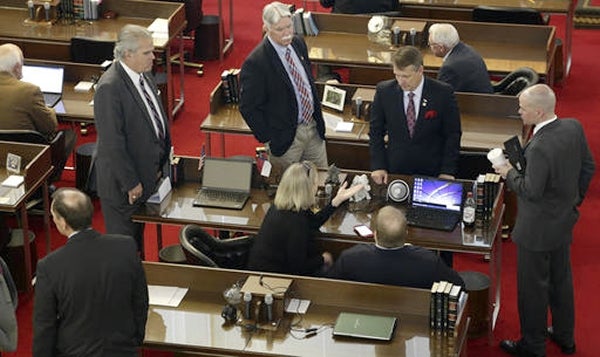Colin Campbell: An assault on transparency & newspapers
Published 9:43 pm Tuesday, October 10, 2017

- North Carolina lawmakers gather on the House floor for a special session in 2016 in Raleigh. (AP Photo/Gerry Broome)
RALEIGH — Imagine this hypothetical scenario: Someone wants to build a factory in your neighborhood, a change that would bring noise, pollution and heavy truck traffic. Your local government has to hold a public hearing and OK the proposal first, but that’s already happened before you even heard about it.
The bulldozers have arrived to start construction, and it’s too late for you to fight back. This scenario could become reality in one North Carolina county after the state legislature approved a bill Oct. 5 that would take public notices out of local newspapers.
The bill targeted only Guilford County in order to circumvent Gov. Roy Cooper’s veto of similar legislation — governors can’t veto bills that only affect a few counties. But some lawmakers want to make the change statewide: Allowing local governments to put important notices on their own websites instead of newspapers. It’s billed as a way to cut costs on newspaper advertising, and supporters argue that printed classified ads are obsolete because the internet exists.
It’s true that many of us don’t read every word of our newspaper’s classified section. But even fewer of us like to browse through county government websites just for fun. And all it takes to spread the word is one person spotting the legal notice in the paper — if it’s a big deal, all the neighbors will soon hear about it.
The switch to website notices only impacts a tiny fraction of local government budgets. The city of Greensboro spent about $69,000 on legal ads in the past fiscal year, or about 0.014 percent of the city’s annual budget. So why was this a priority in a special legislative session?
The proposal’s sponsor, Republican Sen. Trudy Wade of Guilford County, insists it’s not personal. But she’s been a frequent critic of the Greensboro News & Record, where editorials often criticize her. As a vote on the notices bill loomed, the paper’s opinion page ran a headline calling it a personal “vendetta” by Wade. The senator, in turn, was spotted proudly showing off the headline on the Senate floor to colleagues, as if it were a sort of trophy.
The fact that this bill only impacts one county is a troubling sign for freedom of the press in North Carolina. Newspaper publishers might get threatening phone calls from legislators upset with an article: “Be nicer,” they’ll say, or we’ll pass another bill for your county and eliminate a chunk of your revenue.
Another provision in the bill should concern fans of small government and the free market. Many legal notices don’t even involve government — they’re notices of things like foreclosures and estate sales that attorneys and others involved in a legal proceeding currently must place in a newspaper.
The bill allows county governments to steal away that revenue from newspapers by hosting those legal notices on the county website for a fee — an easy new cash cow for government. Newspapers would then have to compete with the county to offer the best price. Counties would probably win because they wouldn’t have the costs associated with printing ads on paper and distributing copies. It’s similar to the government opening a grocery store next to a privately owned store and driving it out of business.
But the stakes are higher: Local newspapers are already struggling to make ends meet, and a the newspaper serving Jamestown in Guilford County has said the loss of legal ads will force it to close. Losing the local paper would mean no one would be watching and reporting on local government, leaving elected officials to operate without any accountability.
That’s how you end up with corruption.
Colin Campbell is editor of the Insider State Government News Service. Write to him at ccampbell@ncinsider.com.

